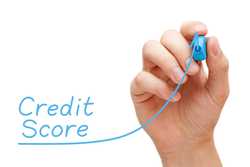Business Credit Score: What Is It, How to Check It

Our evaluations and opinions are not influenced by our advertising relationships, but we may earn a commission from our partners’ links. This content is created by TIME Stamped, under TIME’s direction and produced in accordance with TIME’s editorial guidelines and overseen by TIME’s editorial staff. Learn more about it.
While individual consumers are assigned a personal credit score based on their credit usage, payment history, and other factors, the same can be said about businesses and business credit scores. That said, there are key differences between personal scores and business credit scores that make each type unique, including which third parties and credit bureaus assign them.
Just like personal credit scores for consumers, a business credit score can impact a business’s operations and whether it can qualify for funding with the best rates and terms. This guide to business credit scores explains the most common types, what a good business credit score looks like, and how to build business credit for the future.
A business credit score is a score assigned to businesses that shows how well a company manages its credit and how much of a risk they are to lenders. These scores are determined using similar factors as personal credit scores, including payment history, use of credit, credit history length, and the mix of types of credit in use.
All types of businesses can have a business credit score, from large companies with thousands of employees to solopreneurs. The key to having a business credit score is having lenders, suppliers, vendors, or any combination report payment history and other details to the credit bureaus. If you have a business credit card that reports to the business credit bureaus, for example, you probably have a business credit score.
Unlike personal credit scores from the three credit bureaus (Experian, Equifax, and TransUnion) that follow a similar format, business credit scores can look very different based on where they originate. In other words, what is considered a "good" business credit score can vary dramatically across the companies that create them.
Below are details on the five most common business credit scores and how each type works.
Dun & Bradstreet is a business credit bureau that focuses exclusively on business credit, and is where the Dun & Bradstreet PAYDEX Score originated from. According to the company, the PAYDEX Score is a "dollar-weighted indicator of a business's past payment performance” and can fall between 1 and 100.
PAYDEX scores over 80 are typically considered "good," yet Dun & Bradstreet actually breaks its scores down into three different risk categories. These risk tiers display each level of risk in the following way:
| Risk tier | Dun & Bradstreet PAYDEX Score |
|---|---|
High risk | 0 to 49 |
Moderate risk | 50 to 70 |
Low risk | 80 to 100 |
Interestingly, scores are not generated automatically. Businesses have to sign up for a D-U-N-S Number on the Dun & Bradstreet website to be assigned a PAYDEX score, which is what makes it possible for vendors and other third parties to report payment history to this credit bureau.
Experian, a major credit bureaus for consumers, also issues business credit scores. There are two types of Experian Intelliscore business credit scores—Intelliscore Plus and Intelliscore Plus V2.
Intelliscore Plus uses factors like tradeline and collections information, public filings, new account activity, recent credit inquiries, and key financial ratios to assign a score. Meanwhile, Intelliscore Plus V2 bases credit scores on "Experian's wide range of trade, collection, public record, and firmographic data," according to the credit bureau.
With both Experian Intelliscore types, businesses can have a business credit score of 1 to 100. While higher scores are better and scores over 76 are considered "good," here's how Experian breaks down score ranges based on various levels of risk:
| Risk tier | Experian Intelliscore |
|---|---|
High risk | 1 to 10 |
Medium to high risk | 11 to 25 |
Medium risk | 26 to 50 |
Low to medium risk | 51 to 75 |
Low risk | 76 to 100 |
Equifax is another major credit bureau for consumers that also covers business credit. Equifax has two types of business credit scores—the Business Credit Risk Score and the Business Failure Score.
According to Equifax, its Business Credit Risk Score is built on "pre-recession, recession, and post-recession data" with the goal of helping companies "set appropriate credit terms based on the potential for business failure and payment delinquency." Meanwhile, the Business Failure Score is created using a risk-scoring model that predicts the likelihood of a company going out of business within the next 12 months.
Since these two business credit scores are distinct from one another, they use different ranges to show where businesses fall on the spectrum based on their level of risk.
The Business Credit Risk Score range is between 101 and 922. A higher score indicates a lower overall level of risk. A "good" Business Credit Risk Score is typically considered any score of 700 or higher.
The Business Failure Score can fall between 1,000 and 1,880. Higher scores show a lower risk of insolvency. A "good" Business Failure Score from Equifax is typically any score of 1,315 or higher.
While FICO is a company that creates credit scoring models and not a credit bureau, it does create a business credit score known as the FICO Small Business Scoring Service (SBSS) Credit Score. According to FICO, its score is one of the most widely used when assessing the risk of U.S. small business credit applicants who apply for Small Business Administration (SBA) loans.
The FICO SBSS Credit Score always falls between 1 and 300, with 300 being the highest possible score. Businesses applying for a SBA loan typically need to have a score of 155 or higher.
While there are many ways to check your personal credit score for free (including the MyFICO.com website), the same can't be said for business credit scores. Each third-party company or business credit bureau that creates business credit scores requires you to purchase your report and scores on a one-time or subscription basis.
The cost of getting a business credit report and score varies from company to company and based on the method you choose. For example, you can purchase a business credit report and PAYDEX Score from Dun & Bradstreet for your company or any other business for $139.99.
Some companies also offer business credit report monitoring services, which aim to help prevent stolen business information while adding another layer of protection for confidential data.
While the different business credit scores are calculated in a slightly different way, each model relies on many of the same factors. These can include:
Personal and business credit scores work similarly, although personal credit scores are for consumers while business scores are for companies. There are other differences in how personal and business credit work, including the following:
The types of credit scores for consumers and businesses are totally different, even though some of the companies overlap. We already outlined the types of business credit scores you can have in this guide. The most popular consumer credit scores are FICO scores and VantageScore credit scores.
Consumer credit is tied to your Social Security number (SSN), whereas business credit is tied to something called an Employer Identification Number (EIN). Where the government uses an SSN to recognize individuals for tax purposes, an EIN is how government agencies recognize businesses for tax purposes.
When it comes to business versus personal credit cards, however, you may notice that some business card applications request both an SSN and an EIN. That's because business credit cards that require a personal guarantee can still build business credit.
Consumer credit comes with considerably more legal protections than business credit. For example, small businesses do not qualify for legal protections afforded to individuals in the Credit Card Accountability Responsibility and Disclosure Act (CARD Act) of 2009.
A business credit score is beneficial for a few key reasons. First, having business credit means you can apply for business credit cards and loans and get financing faster and easier than you would if you were applying as an individual with your personal credit score.
Second, having a good business credit score can help you get better rates and terms when you borrow money, even if a personal guarantee is required.
There are also situations where companies want to borrow money without putting anyone's personal credit on the line. In that case, having a business credit score and an EIN may be the only way to get approved.
Many of the same steps required to boost a personal credit score also apply to business credit scores. Whether you're building business credit from scratch or you want to improve one of your business credit scores before you apply for a business credit card, these moves can help:
If you want to apply for a business loan to invest in inventory or equipment, having a solid business credit rating can get your loan application to the finish line. Without business credit, you may be left trying to finance company needs with cash or by using your personal credit.
This is just one reason having a business credit score can benefit you, but there are others. In summary, a business credit score can help your business reach its full potential.
You cannot check your business credit score for free like you can a personal credit score. You have to purchase a business credit report and score from the companies that offer this option, including Dun & Bradstreet, Experian, and Equifax.
According to Experian, negative trade data can stay on your business credit reports for 36 months (three years). Meanwhile, bankruptcies are reported for nine years and nine months, collections, judgments, and tax liens are reported for six years and nine months, and Uniform Commercial Code filings are reported for five years.
If your business is new, you may not have a business credit score. You definitely do not have a score if your business doesn't have any relationships that would lead to the reporting of business activity to the business credit bureaus.
The information presented here is created by TIME Stamped and overseen by TIME editorial staff. To learn more, see our About Us page.



